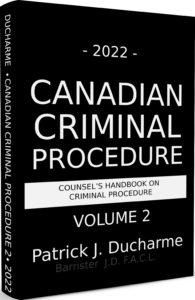 |
| Patrick J Ducharme |
An indictment is not a sworn document, but is signed by the prosecutor who prefers the indictment. The act of preferring an indictment is the act of presenting the indictment to the court. This act of preferring an indictment is considered complete when the document is before the court and the matter is ready to proceed to trial.
All indictments are preferred after the accused has been ordered to stand trial following a preliminary inquiry in the Provincial Court of Justice, or, the accused has waived the preliminary inquiry with the consent of the prosecutor, or, has not requested a preliminary inquiry and is preferred pursuant to subsection 574(1.1) of the Code. If the Judge presiding at the preliminary inquiry refuses to order the accused to stand trial on another offence disclosed by the evidence, it does not mean that the accused was discharged on that other offence. Consequently, an indictment may still be preferred for another offence under subsection 574(1)(b). The term “preferred” refers to the prosecutor filing the indictment before the Superior court and the prosecutor advising the court the prosecution is ready to proceed to trial.1
If an accused has not had the opportunity to request a preliminary inquiry, or, a preliminary hearing has been held but not concluded, or, the accused has been discharged at the preliminary inquiry, the Crown may only prefer an indictment with the personal written consent of the Attorney General or Deputy Attorney General.2
The Crown may, whether the charges were included in one information or not, prefer an indictment against any person who has been ordered to stand trial on any charge after a preliminary inquiry or on any charge founded on the facts disclosed by the evidence taken on the preliminary inquiry in addition to or in substitution for any charge on which that person was ordered to stand trial.3 The prosecutor may add a charge under section 574 at any time after an order to stand trial and prior to plea in the Superior Court.4 By subsection 574(2) the accused is entitled to consent to a charge or charges added to the indictment other than those referred to in subsections (1) and (1.1), and, other than offences that were committed outside the province where the indictment is preferred, unless such charges have been transferred to the Province or Territory where the indictment is preferred via subsection 478(3)of the Code.
In some instances the Attorney General or the Deputy Attorney General may prefer an indictment when the accused either has not had a preliminary inquiry or has not been ordered to stand trial following a preliminary inquiry.5 The indictment that is preferred in these circumstances is often referred to as a “direct indictment.” Direct indictments will be discussed below. If there is a preliminary inquiry and the accused is not ordered to stand trial the order that is made by the court is referred to as a “discharge”.

The above is the an excerpt of Patrick J Ducharme's book, Canadian Criminal Procedure Volume 2, available at Amazon or in bulk through MedicaLegal Publishing along with Criminal Trial Strategies.
Subscribe to Patrick Ducharme's Youtube Channel
